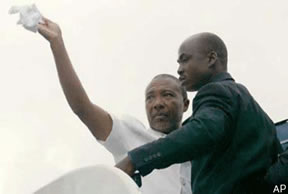
Charles Taylor: The evil that men do
By Vandy Kanyako Jr.
The Perspective
Atlanta, Georgia
April 4, 2006
 |
At the height of his terror power the gangster warlord-turned-president-turned-asylee-turned-indicted war criminal sowed seeds of terror in Liberia, Sierra Leone, Guinea and Cote d’ Ivoire. His rag-tag band of cocaine-induced child soldiers, Viagra-powered mercenaries, marginalized lumpen youths and other undesirable elements from near and far ransacked Liberia and Sierra Leone in particular leaving deadly destruction and shattered dreams in their wake. His pet project, the machete-happy and limb-severing RUF, terrorized Sierra Leone’s hapless population for more than a decade. Now he will get the opportunity to answer to 11 count charges of war crimes and crimes against humanity including widespread amputations, mutilations, sexual violence, abductions, mass killings, and forced recruitment of children into armed groups, as well as the exploitation of Sierra Leone’s diamonds to fill his war chest. The critical question for many would be: Why did 50,000 Sierra Leoneans and 200,000 Liberians have to die?
For more than two decades the former security guard, truck driver, mechanic and gas station salesman operated on the fringes of civilized society. He broke out of his cell in Boston in September 1985 where he was detained awaiting extradition to Liberia on charges of embezzling nearly $1 million whilst serving as Director of the General Services Agency under Samuel Doe. A few days ago he sneaked out of his villa in Calabar and dashed for the Nigeria- Cameroon border. Such audacious attempts are indications of a man determined to flee justice at all cost. It is not surprising therefore that his custodians in Freetown, being fully aware of his antics and out of sheer nervousness, want him carted away to The Hague pronto.
Now that the Freetown-based Special Court has got their man, the whole world, and most especially the hundreds of amputees, the thousands of women who were raped by his loyalists and the thousands of children whose innocence he stole from them, will be watching to see how quickly and how efficiently they bring him (Taylor) to book. A Milosevic-style trial, in which the court rather than the indictee stands trial, will only be to the smooth-talking Taylor’s advantage and will be extremely damaging to the international judiciarization effort to curb such grave crimes.
Indeed Charles Taylor’s trial and eventual conviction will not solve West Africa’s myriad problems. He is just a tiny fraction out of a rather gigantic but messy equation. Mediocre leadership, corruption and mismanagement, grinding poverty, youth unemployment, senseless wars, to name a few, are some of the nagging challenges that the sub-region’s ruling elites (and indeed the international community) must address as a matter of urgency in order to prevent the reincarnation of another Charles Taylor. The former warlord’s ultimate trial should be an ideal opportunity to send a loud and clear message to other would-be human rights violators that they will face the full weight of international law. For such a process to be meaningful however, it must not be used merely to satisfy the burning desire of domestic and external actors to have a villain in the dock but rather as one tool-albeit a potent one-amongst many brought to bear to foster regional peace and stability, reconciliation and economic development in one of the world’s most troubled sub-regions. Taylor’s confinement, trial and eventual conviction will be a painfully slow but necessary therapeutic step in the direction of bringing some level of succor to his countless victims and in the process sanitizing West Africa.
About the autho: Vandy Kanyako Jr. is a Sierra Leonean
in Washington DC, USA
Vandykanyako@gmail.com